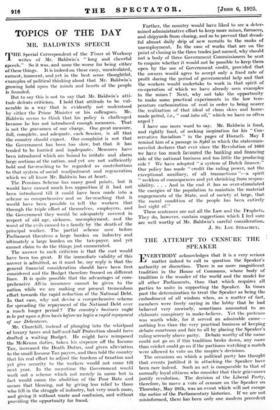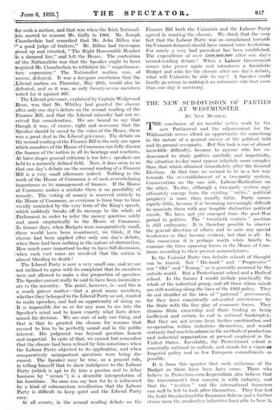THE ATTEMPT TO CENSURE THE SPEAKER
EVERYBODY acknowledges that it is a very serious matter indeed to call in question the Speaker's authority or discretion. There is no more magnificent tradition in the House of Commons, whose body of tradition is the wonder of the world and the model for all other Parliaments, than that which requires all parties to unite in supporting the Speaker. In times past the determination to treat the Speaker as being the embodiment of all wisdom when, as a matter of fact, members were freely saying in the lobby that he had behaved very unwisely, sometimes amounted to an elaborate conspiracy in make-believe. Yet the pretence was worth while, for it served an admirable cause— nothing less than the very practical business of keeping debate courteous and fair to all by placing the Speaker's ruling serenely above party. Debate worthy of the name could not go on if this tradition broke down, any more than cricket could go on if the partisans watching a match were allowed to vote on the umpire's decisions.
The occasions on which a political party has• thought that events justified it in attacking the Speaker have been rare indeed. Such an act is comparable to that of normally loyal citizens who consider that their grievances justify revolution. The decision of the Liberal Party, therefore, to move a vote of censure on the Speaker on Thursday, May 28th, was an event which will not escape the notice of the Parliamentary historian. If we are not misinformed, there has been only one modern precedent .d'or such a motion, and that was when the Irish National- ists moved to censure Mr. Gully in 1902. Mr. Joseph Chamberlain had remarked that Mr. John Dillon was a good judge of traitors." Mr. Dillon had thereupon ,stood up and retorted, " The Right Honourable Member !is a damned liar," and left the House. The contention of the Nationalists was that the Speaker ought to have }required Mr. Chamberlain to withdraw his " unparliamen- Itary expression." The Nationalist motion was, of course, defeated. It was a foregone conclusion that the 1,Liberal motion on Thursday, May 28th, would also be defeated, and so it was, as only twenty-seven members i voted for it against 307.
The Liberalgrievance, explained by Captain Wedgwood !Berm, was that Mr. Whitley had granted the closure ;after only one day's debate on the second reading of the !Finance Bill, and that the Liberal minority had not re- ;ceived fair. consideration. We are bound to say that though it was, of course, right and necessary that the !Speaker should be saved by the votes of the House, there :was a great deal in the Liberal grievance. The debate on the second reading of the Finance Bill is the only one upon which members of the House of Commons can fully discuss the finance of the nation in all its bearings and reactions. :At later stages general criticism is too late ; speakers are held to a narrowly defined field. Now, it does seem to us . that one day's debate on the second reading of a Finance Bill is a very small allowance indeed. Nothing in the work of the House of Commons is of such overwhelming importance as its management of finance. If the House of Commons makes a mistake there is no possibility of remedy. The voting of money is reserved entirely to the House of Commons, as everyone is from time to time vividly reminded by the very form of the King's speech, which suddenly breaks off its message to the whole of :Parliament in order to refer the money question solely • and . most emphatically to the House of Commons. In former days, when Budgets were comparatively small, (there would have been resentment, we think, if the closure had been applied after only one day's debate, when there had been nothing in the nature of obstruction.
• How much more important to-day to have full discussion, }when such vast sums are involved that the nation is almost bleeding to death !
The Liberal Party is now a very small one, and we are !not inclined to agree with its complaint that its members were not allowed to make a due proportion of speeches. The Speaker cannot really be said to have been inconsider- ate to the minority. The point, however, is—and this is a much graver matter—that a great many members, whether they belonged to the Liberal Party or not, wanted to make speeches, and had no opportunity of doing so. It is impossible for us or for any man to see into the Speaker's mind and to know exactly what facts deter- .mined his decision. We are sure of only one thing, and that is that he granted the closure for reasons that seemed to him to be perfectly sound and in the public interest. His judgment was beyond question honest and impartial. In spite of that, we cannot but remember that the closure had been refused by him sometimes when the Labour Party objected to its application, and when comparatively unimportant questions were being dis- cussed. The Speaker may be wise, as a general rule, in telling himself that to show indulgence to the Labour Party (which is apt to fly into a passion and to delay business by " scenes ") is a desirable interpretation of 'his functions. No man can say how far he is influenced by a kind of subconscious recollection that the Labour Party is difficult to keep quiet and the Liberal Party easy.
At all events, in the second reading debate on the Finance Bill both the Unionists and the Labour Party agreed in wanting the closure. We think that the very fact that the Labour Party was so complaisant towards the Unionist demand should have caused some hesitation. For surely a very bad precedent has been established. The expenditure of over £800,000,000 after one day's second-reading debate ! When a Labour Government comes into power again and introduces a Socialistic Budget and asks for the closure after one day's debate, what will Unionists be able to say ? A Speaker could hardly go astray in making it an automatic rule that more than one day is necessary.















































 Previous page
Previous page